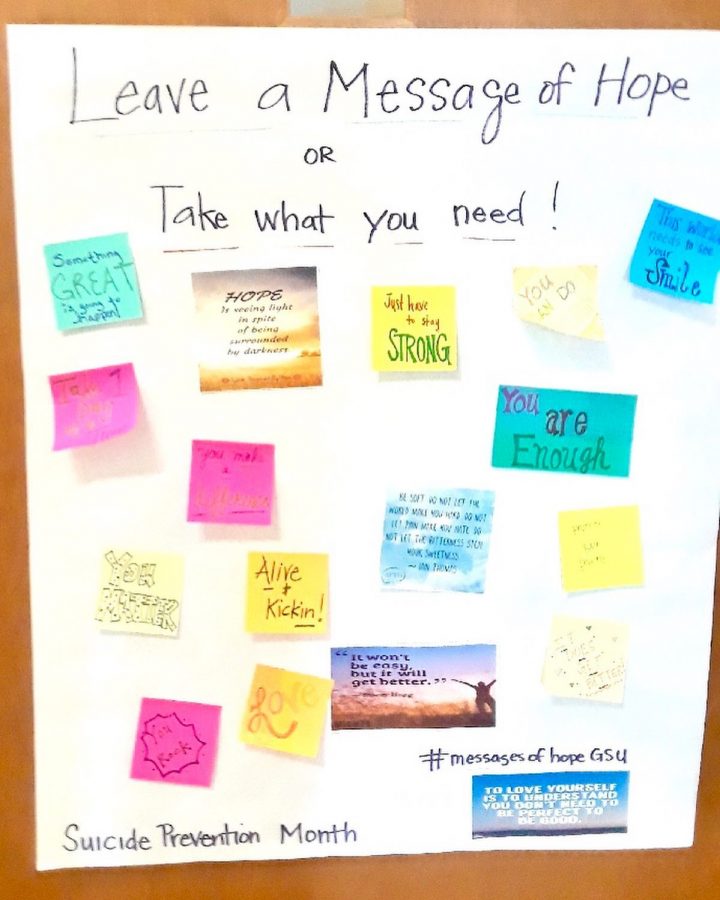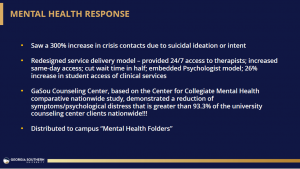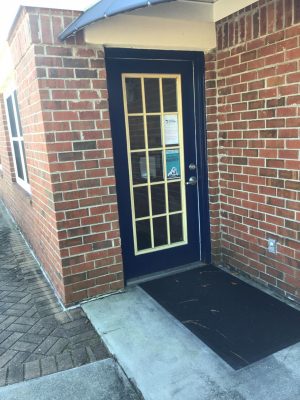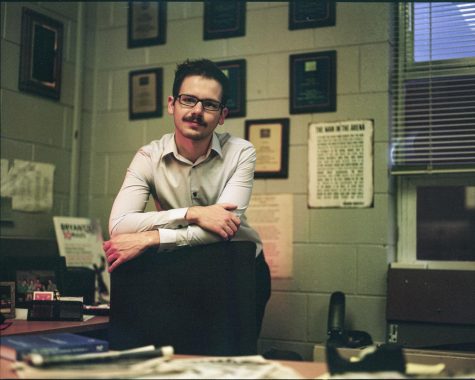Campus Spotlight: Counseling Center
March 23, 2021
Mental health has become a priority for many people since the onset of the COVID-19 pandemic. Access to counseling has become a priority for many and could remain a priority as the world begins to open up.
According to a survey done by Inside Higher Ed, one third of students who sought help at their school’s counseling center did so for COVID-19 related reasons, showing that a significant number of students have had their mental health directly impacted by the pandemic.
The other two thirds of the students visited their counseling centers for reasons not related to the pandemic. The stresses of school life that existed before 2020 still exist now. Students have been forced to deal with these issues and COVID-19 related issues simultaneously.
Students at Georgia Southern should seek out the Counseling Center at the Statesboro or Armstrong campuses if they need help overcoming mental or emotional anguish.
Georgia Southern’s Counseling Center provides many services for students seeking to focus on improving their mental health. This week’s Campus Spotlight will go over these services, and shed some light on some of the challenges the Counseling Center has overcome in recent months.
Dr. Jodi Caldwell is the Executive Director of the Counseling Center. She explained that the Counseling Center has three pillars that state its mission.
“Direct Clinical Service, Primary Prevention/Outreach Programming, and Professional Development and Training. All of these pillars are focused on improving students’ lives,” Caldwell said.
The clinical service aspect of the Counseling Center remains its most well-known service available, and offers a wide variety of specific types of counseling. Examples include individual and relationship counseling, group therapy, around-the-clock crisis counseling, short-notice sessions, case management and drop-in workshops.
Students should feel comfortable knowing that any issue can be addressed through the Counseling Center, but the members of the Counseling Center also want students to have the empowerment and strategies necessary to cope with issues on their own.
The center’s prevention and outreach section spearheads this effort.
“Our outreach programs educate the campus community not only on recognizing mental health concerns within the individual, but also in how to recognize signs of distress in others,” Caldwell explained.
The goal of this aspect of the department is to educate students to not only work on their own
Mental health has become a priority for many people since the onset of the COVID-19 pandemic. Access to counseling has become a priority for many and could remain a priority as the world begins to open up.
According to a survey done by Inside Higher Ed, one third of students who sought help at their school’s counseling center did so for COVID-19 related reasons, showing that a significant number of students have had their mental health directly impacted by the pandemic.
The other two thirds of the students visited their counseling centers for reasons not related to the pandemic. The stresses of school life that existed before 2020 still exist now. Students have been forced to deal with these issues and COVID-19 related issues simultaneously. Students at Georgia Southern should seek out the Counseling Center at the Statesboro or Armstrong campuses if they need help overcoming mental or emotional anguish.
Georgia Southern’s Counseling Center provides many services for students seeking to focus on improving their mental health. This week’s Campus Spotlight will go over these services, and shed some light on some of the challenges the Counseling Center has overcome in recent months.
Dr. Jodi Caldwell is the Executive Director of the Counseling Center. She explained that the Counseling Center has three pillars that state its mission.
“Direct Clinical Service, Primary Prevention/Outreach Programming, and Professional Development and Training. All of these pillars are focused on improving students’ lives.”
The clinical service aspect of the Counseling Center remains its most well-known service available, and offers a wide variety of specific types of counseling. Examples include individual and relationship counseling, group therapy, around-the-clock crisis counseling, short-notice sessions, case management, and drop-in workshops.
Students should feel comfortable knowing that any issue can be addressed through the Counseling Center, but the members of the Counseling Center also want students to have the empowerment and strategies necessary to cope with issues on their own.
Prevention and Outreach spearheads this effort. Dr. Caldwell explained “Our outreach programs educated the campus community not only on recognizing mental health concerns within the individual, but also in how to recognize signs of distress in others.”
The goal of this aspect of the department is to educate students to not only work on their own mental health, but to recognize distress signals from those around them. This allows students to improve the lives of others as well as themselves.
The goal of education remains consistent throughout these three pillars, and the training program is no exception. The Counseling Center helps students earn degrees in fields related to mental health, creating a greater availability of licensed psychologists, especially at the local and state levels.
The Professional Development and Training program offers an undergraduate field experience course, a Practicum Program for Psychology and Education students, and a Doctoral Internship course. These three programs help students achieve a wide variety of goals if they want a career providing mental healthcare.
Like many departments throughout every university, the Counseling Center was forced to make a variety of adaptations when faced with the COVID-19 pandemic and the regulations that came with it. Dr. Caldwell explained that the Counseling Center wasted no time in getting students access to professional help.
“All of our clinicians immediately obtained professional training and certifications to provide telehealth services. We now offer all of our services via HIPAA compliant telehealth platforms: therapy services, workshops, outreach programs, and trainings.”
The new training has allowed clinicians to be readily available for students in isolation. Services such as same-day appointments are significantly more feasible due to the online aspect. The flexibility of the staff at the counseling center has allowed a difficult situation to provide some benefits.
“All of this has only been possible because of the incredible dedication, flexibility and adaptability of our clinical staff & the support of the university administration.”
Telehealth and mental health in general has become more positively received by the public recently, according to Dr. Caldwell.
“A positive trend that has been seen nationwide is the decrease in stigma related to talking about mental health and obtaining mental health assistance. However, the stigma is still out there for many people.”
Dr. Caldwell stressed the importance of continuing to disprove any stigmas that remain against mental health awareness. She emphasized that everybody has bilogical, environmental, and experimental components to mental health.
“We can all reach out for assistance when it is needed and encourage those around us to do the same. Mental health is one piece of wellness – so attending to our holistic wellness (physical, social, spiritual, academic, etc.) can assist us with improving and maintaining our mental health as well.”
The Counseling Center’s values show a department committed to doing its job in as many different capacities as possible. Basic counseling options are the norm on many campuses, but having an area of the school that comprehensively seeks to understand and inform on all aspects of mental health could be seen as a significant benefit.
Students looking to take advantage of these services should seek out the department’s website at https://students.georgiasouthern.edu/counseling/. There, students can find information on mental health, services to help struggling friends and loved ones (HERO folder), and can attend drop-in wellness programs.
Dr. Caldwell also encourages students to call the Counseling Center directly if they are not sure if a service is right for them. Students can also call to request an immediate session.
If you are interested in starting therapy with the Counseling Center, the best way to schedule an initial appointment is to call directly. The number for the Armstrong campus location is (912) 344-2529 and the number for the Statesboro location is (912) 478-5541.
As of May 2021, the Counseling Center is allowing students to choose between online counseling and in-person appointments. Dr. Jodi Caldwell gave this statement via email:
“Beginning this past May, students have the choice of whether they would like to engage in ongoing telehealth or ongoing in-person counseling at either of our centers (Armstrong Campus or Statesboro Campus.) All of our services, as well as a new daily calendar of offerings, can be found on our website: https://students.georgiasouthern.edu/counseling/”






